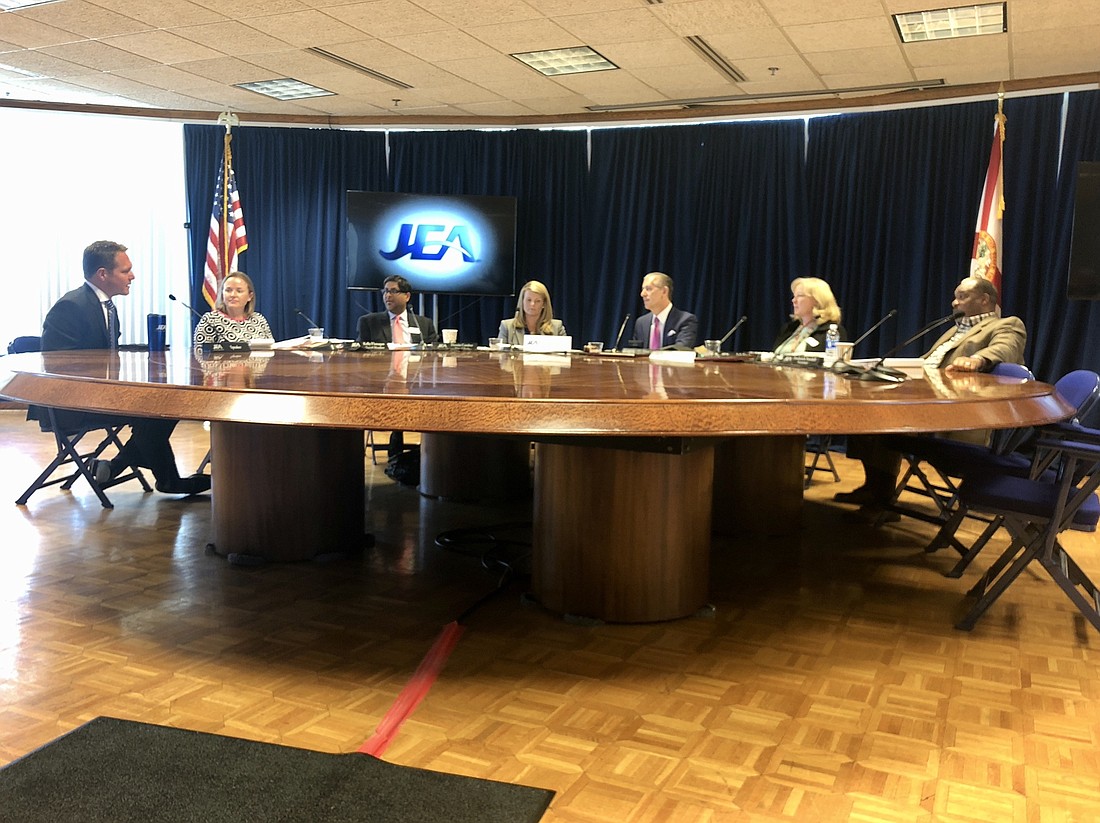
The JEA board of directors on Tuesday unanimously approved Aaron Zahn to lead the organization as interim CEO.
Zahn stepped down Friday as a member of the JEA board so he could pursue the position vacated by former Managing Director and CEO Paul McElroy.
Council approved his appointment to the JEA board on Feb. 28. McElroy resigned April 6.
In the wake of McElroy’s decision, Chief Financial Officer Melissa Dykes served in the interim role for 10 days and was considered along with Zahn as a candidate to serve in that capacity until a permanent replacement is found.
The vote for Zahn came after one to keep Dykes in the role mustered two votes — from Chair Alan Howard and Fred Newbill.
Dykes needed four votes to keep the job.
The board decided 5-0 to appoint Zahn in a second round of voting. The seven-member board has two vacancies — Zahn’s and another.
Neither Dykes nor Zahn commented after the meeting.
Howard called the outcome “an unusual turn of events.”
“I have absolute confidence in Ms. Dykes,” Howard said.
He said he initially voted for her because of her experience and commitment to JEA over the past six years.
“However, given the votes that were cast, it appeared to me that Mr. Zahn would carry the day and I wanted to make sure he had the support of the entire board.”
Zahn’s tenure as interim CEO is effective immediately. He is stepping down as managing partner and CEO of Pascal Partners. The company primarily focuses on investing in energy storage and generation infrastructure.
Zahn’s strategic plan
Zahn provided board members with what he referred to as a strategic transition plan he said can help the utility navigate the next six to 12 months while the search for a permanent CEO commences.
Although Zahn has no previous experience leading a utility, he said he would not rule out applying for the permanent job.
Zahn offered several suggestions on how he believes the municipally owned utility should proceed under his tenure, starting with “halting the conversation” surrounding privatization that began in late November.
“I believe JEA leadership should suppress the impulse to prematurely discuss and decide on the notion of sell versus don’t sell,” Zahn told board members.
“Instead, let us focus on building a consensus,” he said.
Zahn said leadership should craft a vision for the utility’s future, beginning with altering the company’s organizational chart.
He said the current CEO position has too many direct staff reports, which impedes the utility’s ability to proceed with strategic plans.
“What I would look at is effectively creating more of a COO and president role,” he said.
A chief operating officer or president would handle day-to-day operations, while the CEO works with shareholders, the board, government officials and employee unions.
As part of the agreement to install Zahn as interim chief executive, Howard said Dykes will assume an “enhanced” role in the organization, along with a contract that matches Zahn’s in length.
Dykes does not have a contract as CFO.
Details like compensation and other provisions still need to be determined for both Zahn and Dykes. Dykes makes $358,779 a year.
Howard said those conversations will begin immediately.
Mayor Lenny Curry would nominate a replacement for Zahn’s board membership. He has yet to nominate a replacement for Delores Kesler, whose term expired in January.
Finding a permanent fit
Finding the right candidate to become the utility’s permanent CEO will be difficult, according to Chief Human Resources Officer Angelia Hiers.
She said representatives from executive search firms told her the privatization conversation will harm JEA’s ability to find quality candidates.
“As a matter of fact, we’ve even had one firm decline to accept an RFQ if we were to present one to them,” Hiers said. “I have never had a firm to decline business of that nature on that level before.”
Another issue, she said, is search firms are not clear about what type of CEO the utility’s board is seeking – someone to lead the company and develop a long-term strategy or a candidate to lead it through a transition into a private company.
Board member Husein Cumber reminded the board it has not taken an official position on privatization.
“That conversation affects what type of CEO we bring on,” Cumber said.
Howard said the search should be for a CEO with a long-term strategic vision and agreed that privatization talks should stop.
JEA entered a three-year contract with search firm ZRG Partners last spring, which Hiers said could begin the search immediately.
Hiers said ZRG’s fee is capped at $80,000 plus up to $10,000 for travel and related expenses.
She said other search firms typically charge up to one-third of the selected candidate’s first-year salary. She estimates that charge would be at least $160,000.
Although she recommended using ZRG Partners, board members decided to seek additional responses through a Request for Qualifications.
Because that process could take up to 120 days, the board voted unanimously to waive certain time-frame-related provisions in the JEA Charter to expedite the hunt for a search firm to three weeks, giving the body a week to review those candidates before its May meeting.